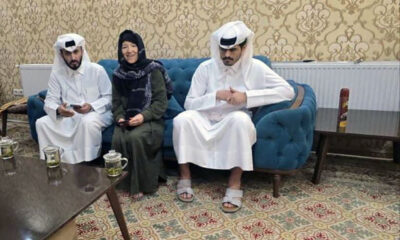Regional
Russia has secret war drones project in China, intel sources say
The Ukrainian government did not respond to a request for comment for this article.

Russia has established a weapons programme in China to develop and produce long-range attack drones for use in the war against Ukraine, according to two sources from a European intelligence agency and documents reviewed by Reuters.
IEMZ Kupol, a subsidiary of Russian state-owned arms company Almaz-Antey, has developed and flight-tested a new drone model called Garpiya-3 (G3) in China with the help of local specialists, according to one of the documents, a report that Kupol sent to the Russian defence ministry earlier this year outlining its work.
Kupol told the defence ministry in a subsequent update that it was able to produce drones including the G3 at scale at a factory in China so the weapons could be deployed in the “special military operation” in Ukraine, the term Moscow uses for the war.
Kupol, Almaz-Antey and the Russian defence ministry did not respond to requests for comment for this article. China’s foreign ministry told Reuters it was not aware of such a project, adding that Beijing had strict control measures on the export of drones, or unmanned aerial vehicles (UAVs).
Fabian Hinz, a research fellow at the International Institute for Strategic Studies, a London-based defence think-tank, said the delivery of UAVs from China to Russia, if confirmed, would be a significant development.
“If you look at what China is known to have delivered so far, it was mostly dual-use goods – it was components, sub-components, that could be used in weapon systems,” he told Reuters. “This is what has been reported so far. But what we haven’t really seen, at least in the open source, are documented transfers of whole weapon systems.”
Still, Samuel Bendett, an adjunct senior fellow at the Center for a New American Security, a Washington-based think tank, said Beijing would be hesitant to open itself up to international sanctions for helping Moscow’s war machine. He said more information was needed to establish that China was playing host to production of Russian military drones.
The White House National Security Council said it was deeply concerned by the Reuters report of the drones programme, which it said appeared to be an instance of a Chinese company providing lethal assistance to a U.S.-sanctioned Russian firm.
The White House has not seen anything to suggest the Chinese government was aware of the transactions involved, but China has a responsibility to ensure companies aren’t providing lethal aid to Russia for use by its military, a spokesperson added.
Asked about the Reuters report, a NATO spokesperson said via email: “These reports are deeply concerning and Allies are consulting on this matter.”
“The Chinese government has a responsibility to ensure its companies are not providing lethal assistance to Russia,” added the spokesperson, Farah Dakhlallah. “China cannot continue to fuel the largest conflict in Europe since the Second World War without this impacting its interests and reputation.”
Britain’s Foreign Office called on China to stop providing diplomatic and material support to Russia’s war effort.
“We are extremely concerned by reports that Russia is producing military drones in China,” a spokesperson said.
“This adds to a growing body of open-source evidence that Chinese companies are enabling Russia’s illegal invasion of Ukraine. The supply of weapons would be a direct contradiction to statements from China that it would not provide weapons to relevant parties of the conflict.”
The G3 can travel about 2,000 km (1,200 miles) with a payload of 50 kg (110 pounds), according to the reports to the Russian defence ministry from Kupol, which was placed under U.S. sanctions in December 2023. Samples of the G3 and some other drone models made in China have been delivered to Kupol in Russia for further testing, again with the involvement of Chinese experts, they said.
The documents do not identify the Chinese drone specialists involved in the project that it outlined, and Reuters was unable to determine their identity, Reuters reported.
Kupol has taken delivery of seven military drones made in China, including two G3s, at its headquarters in the Russian city of Izhevsk, according to the two separate documents reviewed by Reuters, which are invoices sent to Kupol in the summer by a Russian firm that the two European intelligence sources said serves as an intermediary with Chinese suppliers. The invoices, one of which requests payment in Chinese yuan, do not specify delivery dates or identify the suppliers in China.
The two intelligence sources said the delivery of the sample drones to Kupol was the first concrete evidence their agency had found of whole UAVs manufactured in China being delivered to Russia since the Ukraine war began in February 2022.
They asked that neither they nor their organisation be identified due to the sensitivity of the information. They also requested certain details related to the documents be withheld, including their precise dates.
The sources showed Reuters five documents in all, including two Kupol reports to the ministry in the first half of the year and the two invoices, to support their claims of the existence of a Russian project in China to manufacture drones for use in Ukraine. The programme has not previously been reported.
Kupol’s reports did not give more precise locations for sites related to the project. Reuters was also unable to determine whether the defence ministry gave the company the green light to proceed with the serial production proposed.
Beijing has repeatedly denied that China or Chinese companies have supplied Russia with weapons for use in Ukraine, saying the country remains neutral.
In response to questions for this article, the foreign ministry told Reuters that China’s position presented a contrast with other nations with “double standards on arms sales” whom it said had “added fuel to the flames of the Ukrainian crisis”.
The ministry said earlier this month that there were no international restrictions on China’s trade with Russia, when responding to a Reuters report that Kupol had started to produce the Garpiya-A1 long-range military drone in Russia using Chinese engines and parts.
The new documents reported here indicate state-owned Kupol has gone further by sourcing complete UAVs from China.
Both Russia and Ukraine are racing to ramp up their production of drones, which have emerged as highly effective weapons in the war.
David Albright, a former U.N. weapons inspector who heads the Institute for Science and International Security research group, and has conducted extensive work on Chinese and Russian cooperation on drone production, told Reuters that Kupol could skirt Western sanctions on Russia by setting up a production facility in China where it could access advanced chips and expertise.
But Bendett at the Center for a New American Security said Beijing had reason to tread carefully: “For a factory to exist officially that builds UAVs for the Russians exposes China to some of the more severe effects of the sanctions, so it’s not clear the extent to which China would be willing to expose itself.”
The Ukrainian government did not respond to a request for comment for this article.
The G3 is an upgraded version of the Garpiya-A1 drone, according to Kupol’s reports sent to the defence ministry. It was redesigned by Chinese experts working off blueprints of the Garpiya-A1, they said.
Kupol said that within eight months, the project in China would be ready to produce a Chinese-designed REM 1 attack UAV with a payload of 400 kg. The two European intelligence sources said this system would be similar to the U.S. Reaper drone.
The sources said another Russian defence firm called TSK Vektor acted as the intermediary between Kupol and Chinese suppliers in the project. They said the Russian firms worked with a Chinese company called Redlepus TSK Vector Industrial, based in Shenzhen, without specifying Redlepus’ role, read the report.
TSK Vektor and Redlepus did not respond to requests for comment.
A separate document reviewed by Reuters reveals plans involving Kupol, TSK Vektor and Redlepus to establish a joint Russian-Chinese drone research and production centre in the Kashgar special economic zone in China’s Xinjiang province.
Reuters was unable to determine who produced the document, which bore the logos of the three companies, or identify the intended recipient.
The 80-hectare “Advanced UAV Research and Manufacturing Base” would be able to produce 800 drones a year, the document said. No timeline was given for when it would be operational.
Last week, Russian President Vladimir Putin said his military had received around 140,000 drones in 2023 and that Moscow planned to increase this number tenfold this year.
“Whoever reacts faster to demands on the battlefield wins,” he told a meeting in St Petersburg about drone production.
Regional
Powerful quake in Southeast Asia kills several, Myanmar declares state of emergency
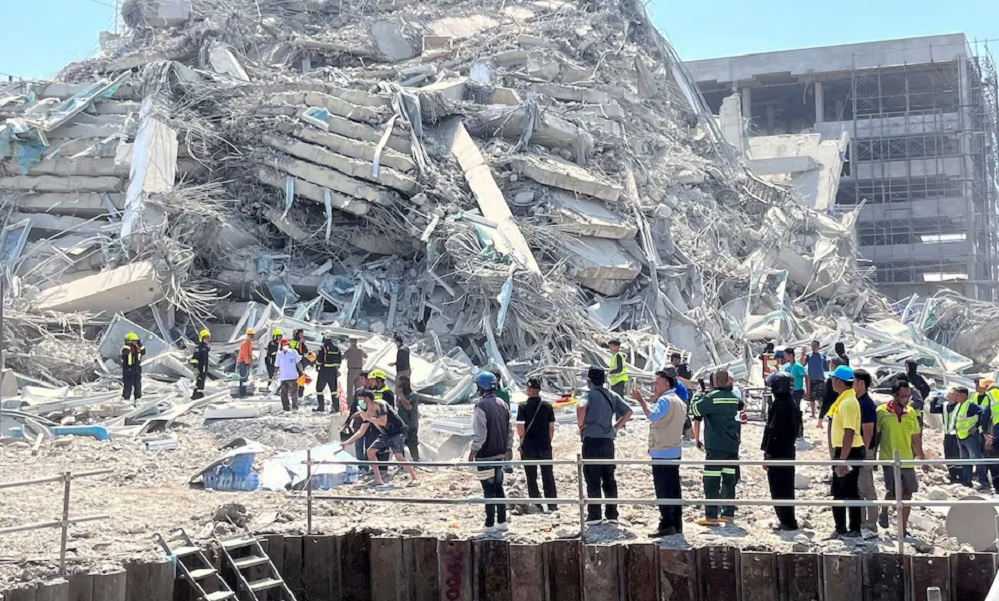
A powerful earthquake rocked Southeast Asia on Friday, killing several people, bringing down a skyscraper under construction in Bangkok and toppling buildings in neighbouring Myanmar, where the ruling junta declared a state of emergency in some areas.
At least three people were killed in the town of Taungoo in Myanmar when a mosque partially collapsed, witnesses said, while local media reported that at least two people died and 20 were injured after a hotel collapsed in Aung Ban, Reuters reported.
In Thailand, at least one person was killed and dozens of workers were rescued from under the rubble of the skyscraper that had been under construction in Bangkok, Thailand’s National Institute of Emergency Medicine said.
Bangkok’s city authorities declared the capital a disaster-stricken area, saying they needed to assess and monitor damaged areas, and assist people who might still be at risk.
In Bangkok, people ran out onto the streets in panic, many of them hotel guests in bathrobes and swimming costumes as water cascaded down from an elevated pool at a luxury hotel, witnesses said.
The United States Geological Survey (USGS) said the quake, which struck at lunchtime, was of 7.7 magnitude and at a depth of 10 km (6.2 miles). It was followed by a powerful aftershock.
The epicentre was about 17.2 km from the Myanmar city of Mandalay, which has a population of about 1.5 million.
Myanmar’s ruling military declared a state of emergency in multiple regions.
“The state will make inquiries on the situation quickly and conduct rescue operations along with providing humanitarian aid,” it said on the Telegram messaging app.
Mandalay is Myanmar’s ancient royal capital and at the centre of the country’s Buddhist heartland.
Social media posts showed collapsed buildings and debris strewn across streets in the city. Reuters could not immediately verify the posts.
One witness in the city told Reuters: “We all ran out of the house as everything started shaking. I witnessed a five-storey building collapse in front of my eyes. Everyone in my town is out on the road and no one dares to go back inside buildings.”
Another witness in the city, Htet Naing Oo, told Reuters that a tea shop had collapsed with several people trapped inside. “We couldn’t go in,” she said. “The situation is very bad.”
At least three people died after a mosque in Taungoo partially collapsed, two eyewitnesses told Reuters.
“We were saying prayers when the shaking started… Three died on the spot,” said one of two people who spoke to Reuters.
Local media reported a hotel in Aung Ban, in Shan state, crumbled into rubble, with one outlet, the Democratic Voice of Burma, reporting two people had died and 20 were trapped.
Video and images posted by Myanmar Now showed a roof cratered at a market in the capital, Naypyitaw.
In Mandalay, the outlet’s images showed a clock tower had collapsed and part of the wall by Mandalay Palace was in ruins.
China’s Xinhua news agency said strong tremors were felt in southwestern Yunnan province, which borders Myanmar, but there were no reports of casualties.
Witnesses contacted in Yangon, Myanmar’s largest city, said many people ran out of buildings.
OFFICE TOWER SHAKES IN BANGKOK
One office tower in downtown Bangkok swayed from side to side for at least two minutes, with doors and windows creaking loudly, witnesses said.
Hundreds of employees filed out via emergency stairs as some shocked and panicked workers froze. Loud shrieks could be heard as the building continued to sway.
Outside, hundreds gathered in the afternoon sun, while staff with medical kits found office chairs for the elderly and people in shock.
China’s Xinhua news agency said strong tremors were felt in southwestern Yunnan province, which borders Myanmar, but there were no reports of casualties.
Regional
Iran ready for indirect talks with US, Khamenei aide says

Kamal Kharrazi, an adviser to Iran’s supreme leader, said on Thursday Tehran has not closed all doors to resolve its disputes with the United States and is ready for indirect negotiations with Washington.
Tehran has so far rebuffed U.S. President Donald Trump’s warning it to make a deal or face military consequences. Supreme Leader Ayatollah Ali Khamenei called the message deceptive and Foreign Minister Abbas Araqchi said talks are impossible unless Washington changes its “maximum pressure” policy.
“The Islamic Republic has not closed all doors. It is ready for indirect negotiations with the United States in order to evaluate the other party, state its own conditions and make the appropriate decision,” Kharrazi said, according to the semi-official Iranian Students News Agency.
Iran is meant to soon reply to Trump’s letter, with Araqchi saying last week that Tehran would take into consideration both Trump’s threat and opportunities in its response.
In his first 2017-21 term, Trump withdrew the U.S. from a 2015 deal between Iran and world powers that placed strict limits on Tehran’s disputed nuclear activities in exchange for sanctions relief.
After Trump pulled out in 2018 and reimposed sweeping U.S. sanctions, the Islamic Republic breached and has since far surpassed those limits in its escalating programme of uranium enrichment.
Western powers accuse Iran of having an clandestine agenda to develop nuclear weapons capability by enriching uranium to a high level of fissile purity, above what they say is justifiable for a civilian atomic energy programme.
(Reuters)
Regional
Pakistan, China in talks about security for Chinese nationals
Chinese nationals have been targeted by separatist militants who believe Beijing is helping Pakistan exploit minerals in Balochistan
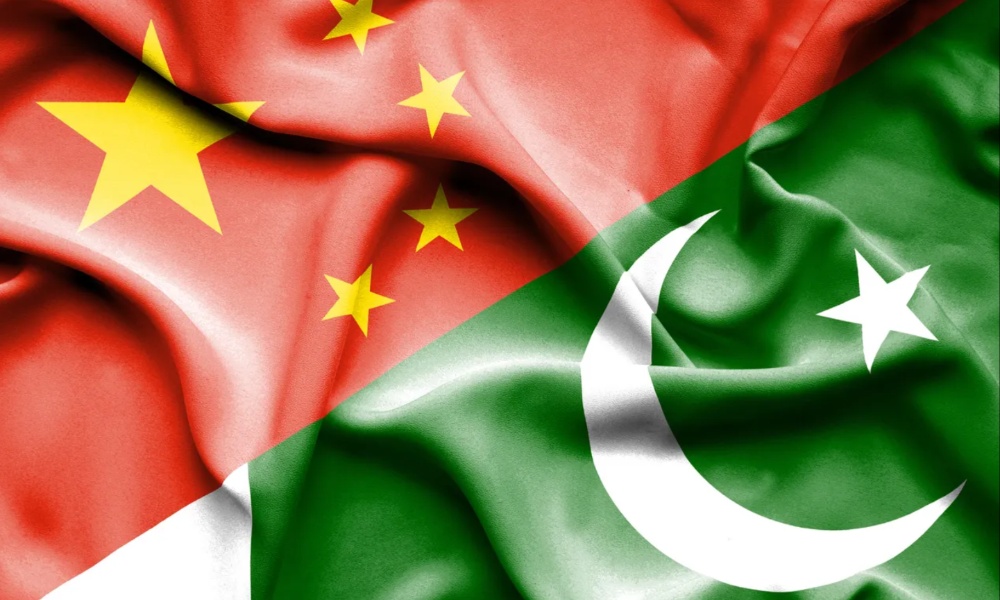
Pakistan and China’s discussions about security measures to protect Chinese nationals working in the South Asian country are a work in progress, Islamabad’s ambassador to Beijing said on Wednesday.
Chinese nationals have been in the crosshairs of separatist militants who believe Beijing is helping Pakistan exploit minerals in the underdeveloped southwestern province of Balochistan, where China has a strategic port and mining interests, Reuters reported.
It is Pakistan’s “national responsibility” and the country is “doing everything possible”, Ambassador Khalil Hashmi told reporters at the sidelines of the Boao Forum in China’s Hainan province.
“I think our two countries work very closely in terms of information sharing, in terms of developing the standard operating procedures” to ensure Chinese nationals working in Pakistan are safe, he said.
“We keep our Chinese friends informed of the steps that we are taking, so it’s a work in progress.”
Beijing has been pushing Pakistan to allow its own security staff to provide protection to thousands of Chinese citizens working there, frustrated by the string of attacks on its citizens.
The push came after a bombing at the Karachi airport last October killed two Chinese engineers who were returning there to work at a power plant.
Hashmi said those talks are ongoing, with a high degree of trust between both countries.
“It’s a complex security environment,” he said, “We have the capability to resolve, to counter and combat and defeat these terrorist forces.”
-

 Sport5 days ago
Sport5 days agoAfghanistan eliminated from Asian Beach Soccer Championship
-

 World4 days ago
World4 days agoSecretive Chinese network tries to lure fired US federal workers, research shows
-
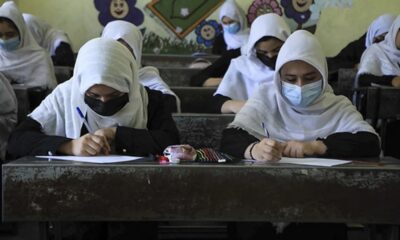
 Latest News5 days ago
Latest News5 days agoUN warns over 4 million Afghan girls will be deprived of education by 2030 if ban continues
-
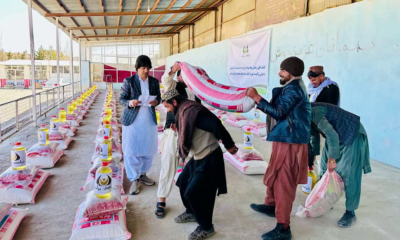
 Latest News5 days ago
Latest News5 days agoDozens of needy families in Ghazni get much needed food aid from Bayat Foundation
-

 Latest News4 days ago
Latest News4 days agoAfghanistan has the right to access Amu River’s water: Uzbek minister
-

 Sport5 days ago
Sport5 days agoAFC Asian Cup 2027 Qualifiers: Myanmar defeat Afghanistan 2-1
-

 Latest News3 days ago
Latest News3 days agoAmnesty international urges Pakistan to halt Afghan deportations
-

 Climate Change4 days ago
Climate Change4 days agoUN and ICRC warn of serious water shortage in Afghanistan










